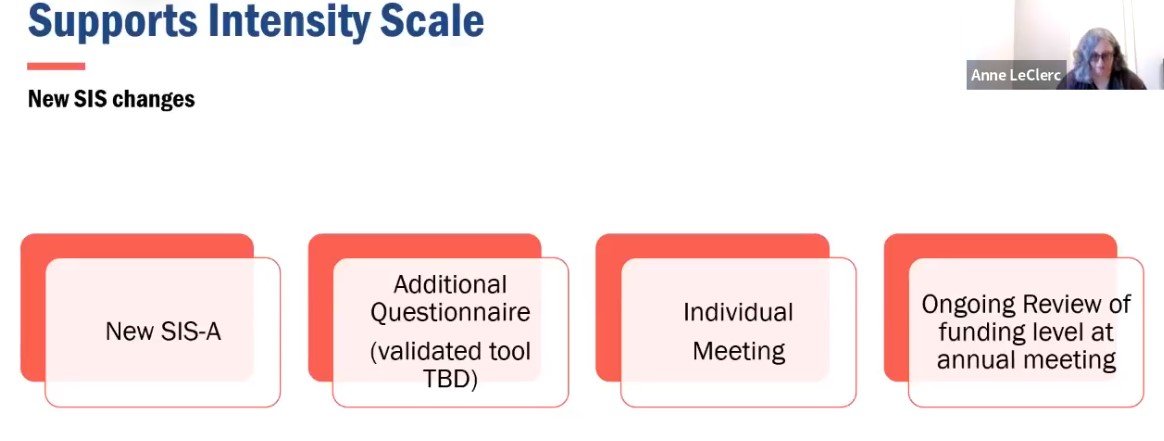Madden to Leave RI Consent Decree Post; Lawyer Dianne Curran Named New Coordinator
/By Gina Macris
Mary Madden, the coordinator of Rhode Island’s efforts to comply with a federal consent decree mandating a transformation of developmental disability services, will step down from that post at the end of March.
Mary Madden File Photo
In her place will be Dianne Curran, a longtime disability rights lawyer who has worked both in Rhode Island and Massachusetts, most recently as a consultant to the Massachusetts Department of Elementary and Secondary Education.
The announcement was part of a public community forum at the North Providence Senior Center Feb. 23 that also catalogued a series of system-wide changes undertaken in recent months, even though developmental disability services still fall short of the funding parents said is necessary to individualize supports for their sons and daughters.
And the audience was reminded that family stories are the ones that make the biggest impact with members of the General Assembly, who in the next several months will consider increases in the current budget and one for the fiscal year which begins July 1.
Curran, al awyer for both Rhode Island Legal Services and the RI Protection and Advocacy System (now the Disability Law Center) during the 1980s, also has served Massachusetts state government in various legal positions in education, human services and developmental disabilities departments. Her lengthy experience in that state includes a brief stint coordinating activities in response to consent decrees affecting adults with developmental disabilities and mental illness.
Madden, a veteran developmental disabilities professional in the private sector, became consent decree coordinator for Rhode Island in January, 2016, at a time when the state was just beginning to craft a response to the 2014 federal consent decree.
On Thursday, Madden said that continuing as consent decree coordinator “was not in the long-term plan.” Madden said she would not have returned to graduate studies in disabilitiesand public policy at Rhode Island College if she were not satisfied that that the state had gained momentum in responding to the consent decree.
Most recently, Rhode Island recruited Kerri Zanchi as director of developmental disabilities after a six-month vacancy in that post.
Zanchi is a career administrator in developmental disability services, who, like Curran, has extensive experience in Massachusetts. She told the audience at Thursday’s forum that she was drawn to the Rhode Island job because of the state’s commitment to community-based services and the opportunity to make lasting change as the state shifts away from isolated day programs and sheltered workshops to comply with the consent decree. The decree requires the state to comply with the 1999 Olmstead decision of the U.S. Supreme Court, which ruled that services for all persons with disabilities must be desegregated in accordance with the Americans With Disabilities Act.
Thursday’s session, attended by about 30 people, was notable for its low-key, conversational tone, a sharp departure from the angry complaints that dominated such meetings during 2016.
In the last six months, developmental disability officials reported, they have made several improvements, including the following:
- speeded up the application process for adult services for individuals with developmental disabilities and adopted a policy to determine eligibility for adult services by the time special education students turn 17
• named a full time transition coordinator, Carolee Leach, to work with high schools and the families of their special education students in preparing for adult life
• implemented a modest raise of about 36 cents an hour for direct care workers, as directed by the General Assembly
• introduced revisions to an assessment process used in determining individual funding allocations
• rolled out a supported employment incentive program for private service providers whohave placed 20 adults with developmental disabilities in jobs in the community since January
An independent court monitor in the consent decree case, however, has said in a recent report that the state must do much more to comply with the consent decree. (Click here for article on monitor’s latest report.)
At the meeting, Zanchi, Madden and several other officials, including Jennifer Wood, General Counsel to the Office of Health and Human Services, heard from parents who said their adult children are lacking individualized community-based services.
Pat Abbate
Pat Abbate, who has a 46 year-old son with significant challenges, said the agency which serves him has good intentions but does not have enough financial resources to individualize services in the community
Tammy Russo, who has a 21 year-old son with disabilities, said he gets “no community services except for me.”
Greg Mroczek said 70 percent of his daughter’s program is in a day center isolated from the community.
Earlier in February, the same developmental disability officials heard a similar theme – a lack of adequate funding - from a mother who said she was forced into managing her daughter’s services because no agency would take her. Mary Genco said she asked 19 agencies, and each one said it had no nurse who wanted to deal with her daughter’s medical needs.
Genco, who is home with her daughter nearly all the time, said she represents growing minority of aging parents who are being “worn out” by adult children with extensive medical or behavioral support needs.
On Thursday, Pat Abbate put numbers on the funding gap. She said – and a check of the state’s Office of Management and Budget (OMB) website confirms – that funding for developmental disabilities lags behind the high of $260 million enacted by the General Assembly for the fiscal year between July 1, 2007 and June 30, 2008. At this time last year, the enacted budget was just shy of $231 million, according to OMB documents.
In response to a federal court order which said the state did not allocate enough money to implement the consent decree, Governor Gina Raimondo later pushed for increases, approved by the General Assembly, which boosted the bottom line to $246.2 million in the current fiscal year.
In her most recent budget proposal in January, Raimondo seeks an additional $4.4 million to finish the current fiscal year, for a total of $250.6 million. For the next fiscal year, beginning July 1, Raimondo has asked the General Assembly for $256.7 million.
Heather Mincey, a developmental disabilities administrator, said, “With our budget we try to advocate for as much money as we can.”
Brian Gosselin, chief strategic officer at OHHS, explained that the various departments of state government are active in their own advocacy, working with OMB and the Governor’s office, from July through December. But the state agencies don’t control the allocations, he said.
With the governor’s budget proposal now in the hands of the General Assembly, Gosselin and Mincey agreed, it’s vital that the community speak up.
“It’s important for families and advocates to be out there to speak to their representatives and let them know what your needs are,” Mincey said.
A member of the audience, who said he works for a developmental disability service agency in Massachusetts, drove home Mincey's and Gosselin’s message.
The voice of families and advocates for developmental disability services is much stronger in Massachusetts than it is in Rhode Island, he said.
“When a family member calls up and gives them (legislators) a story, it makes such an impact,” he said. “I don’t think enough people get that point” in Rhode Island.






























